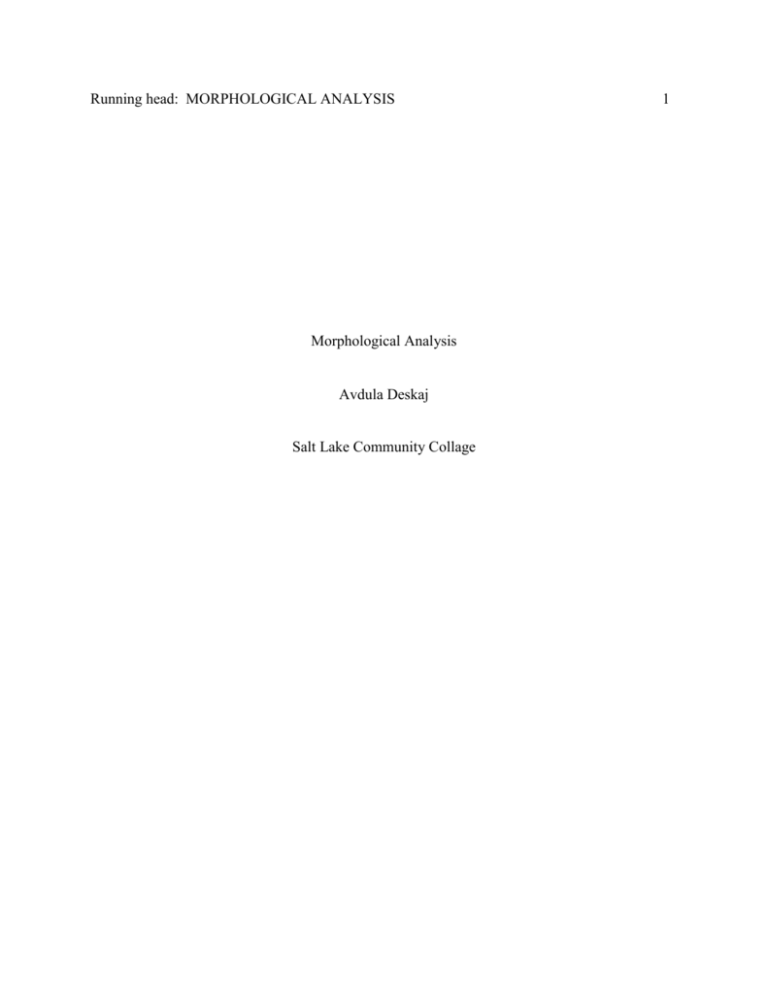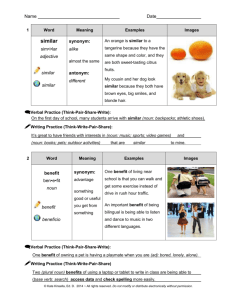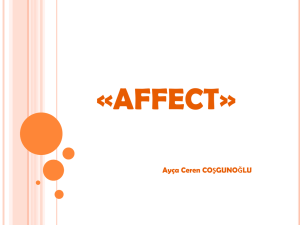Avdula Deskaj`s final project 2
advertisement

Running head: MORPHOLOGICAL ANALYSIS Morphological Analysis Avdula Deskaj Salt Lake Community Collage 1 Running head: MORPHOLOGIC ANALYISIS 2 Abstract For my linguistic final project, I decided to do the morphologic analysis portion. The purpose of this assignment was to analyze an individual’s dialectical usage of ten words. Morphology is the study of patterns of word formation in a given language, including derivation, inflection, and composition (Dictionary.com). The first step was to find someone to interview. The next step was to skip that step and instead pick a relative from Albania I had already interviewed named Ganimete Grajcevci. Finally, I was to tree the words and groups of words uttered in the interview that could not be found in a standard American dictionary. I found that my expectations of geographical morphology particular to Albania did not reflect in my interview with Ganimete, nor did she seem to derive many new words particular to the role playing nerd population. Often times the new word formations were more particular to literature and publishing demographics. Running head: MORPHOLOGIC ANALYISIS 3 Introduction For this project the sample I chose comes from a Recorded Tape I had originally conducted. I chose this sample because I wanted a pure sample. I also chose it because of the uniqueness of the sample. Contemporary Linguistics: An Introduction notes that ―geographical location is probably the most studied social factor affecting variation and that ―natural barriers, such as mountain ranges, have helped limit inter-dialect contact and encouraged dialects to develop along their own distinctive paths I wanted to explore and either disprove or verify this theory first-hand, paying particularly close attention to morphology and lexicon. I supposed that having lived in a country for about twenty-two years and stuck to speaking within her own social class would make Ganimete a perfect candidate to prove my hypothesis. I hypothesized that Ganimete would show an increased number of morphemes unique to Albania (because she was born and raised there.) Participant My participant was Ganimete Grajcevci, born in Kosovo, raised in Prishtina, Kosovo. She went to school to study history. Tools I used my laptop, the internet, I phone, Camera, I used Merriam Webster Online as my American dictionary. Honestly, it can be a bit difficult to determine which dictionary is just American these days, so I used my judgment and googled words that had potential Albanian origins. Running head: MORPHOLOGIC ANALYISIS 4 Strategy I emailed Ganimete asking if I could interview her for a school project. She told me that I could do an interview with her. We met together at my house and I interviewed her. I listened to and transcribed morphological words that were either not found in an American dictionary or words that I thought were ―non standard regardless of whether they were Albanian. I reviewed the Tape multiple times and treed the morphological processes of my transcribed words. Results The morphological trees that I did are at the bottom of the page. The following is a list of words used by Ganimete in my interview along with their respective definitions, contexts, and commentaries: Gonna : contraction. gonna is another way of saying going to. "We're gonna win this game" Query: Verb. Sending a request letter to a publisher for manuscript approval. Craft Noun. Creating stories. It becomes more about studying craft rather than enjoying books for their own sake. Twists Noun. Reduction of plot twist to just twist. ―If you as an author doesn’t know the twist is coming, the chance that the reader knows it’s gonna come is even slimmer. Good fun: Noun. Very fun. Typically don’t see this construction in the U.S. ―Good fun. Running head: MORPHOLOGIC ANALYISIS 5 Feb (February) Noun. (Not typically used in speech. She used to say February. Flappiness : Noun. Something or someone of a flappy nature or quality. Cup-o-tea [stuff]: Adjective. Probably ―cup of tea. Denoting a sense of high-class British, tea and crumpets with the Queen of England type of setting. (Here, due to the hyphenated nature of the word, the noun phrase ―cup of tea has become an adjective to modify ―stuff. Cup-o-tea, in this sense, could not stand on its own without the word ―stuff to modify—it just wouldn’t make much sense.) Kinda: contraction. Adjective: kinda is another way of saying kind of. "I think it's kinda funny" Messing about : Verb. Horse playing. Messing around (sometimes out and about town). Running head: MORPHOLOGIC ANALYISIS 6 Running head: MORPHOLOGIC ANALYISIS 7 Conclusion Unfortunately Ganimete didn’t use nearly as many terms with Albanian as I had originally presumed she would; she actually used more constructions associated with the publishing world. This could have been due to a number of reasons, which I will illustrate in this section. Firstly, Ganimete has implied a certain animosity to where she was raised. Fleeing at her earliest convenience is hardly indicative of a positive relationship to where she was raised. I’ve had many friends who resented their origins and this resentment pushed many of them to adopt another dialect in order to create or step into a different speech community. It seems like there would be a great deal of pressure to speak and write in ―standard ways rather than produce Albanianism, which are often stigmatized. Her exposure to both literature and higher education has painted her morphological and lexical usage with a more academic pattern. or created errors like formative to indicate former, but this is a fairly common occurrence with even the most educated of individuals. As Ganimete is an educated individual, I’m sure she was also aware of her audience, and by extension what Contemporary Linguistics dubs code switching, or the ability to switch between two or more speech communities by adopting their particular dialects. And lastly, the interview felt more like an interrogation than a natural conversation, even though there were apparent (failed) attempts on my part to make it more conversational. I think the point here is that I couldn’t rely on adherence to a stereotype to govern my expectations. Yes, I’m admitting I had false expectations or biases prior to this research project. After all, I’d had much experience with English speakers from Albania, so my brain constructed expectations for me based on what little exposure I did have. Running head: MORPHOLOGIC ANALYISIS References John Thayer Jensen , (1990). Morphology: Word Structure in Generative Grammar books.google.com/books?isbn=9027235678 http://www.translate-albanian.com/en/dictionary-english-albanian/slang http://www.learnersdictionary.com/definition/kid(2014 Merriam-Webster) http://dictionary.reference.com/browse/morphology(2005 by Houghton Mifflin Company) 8









